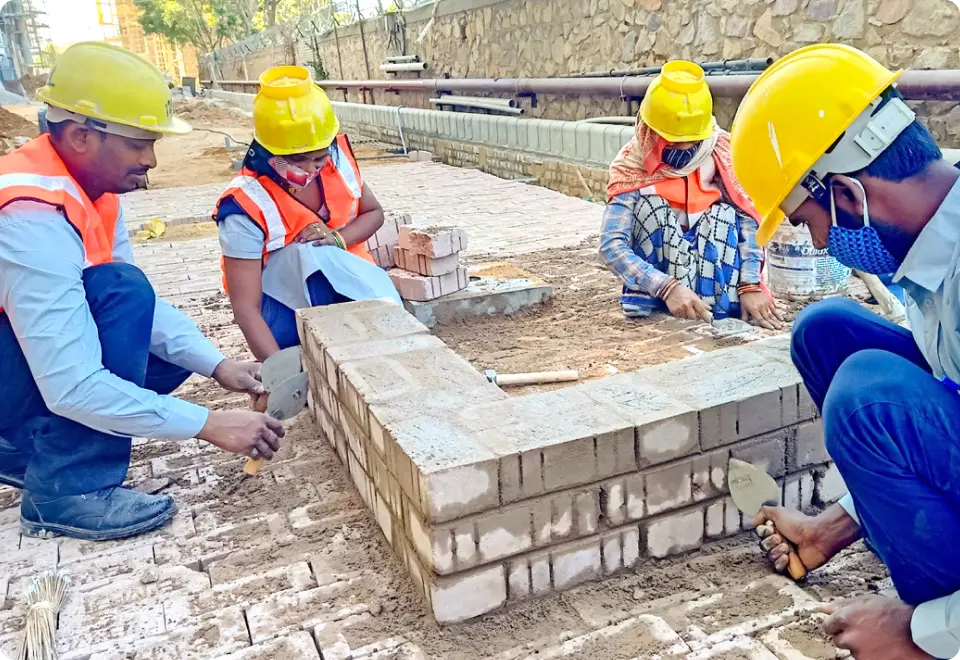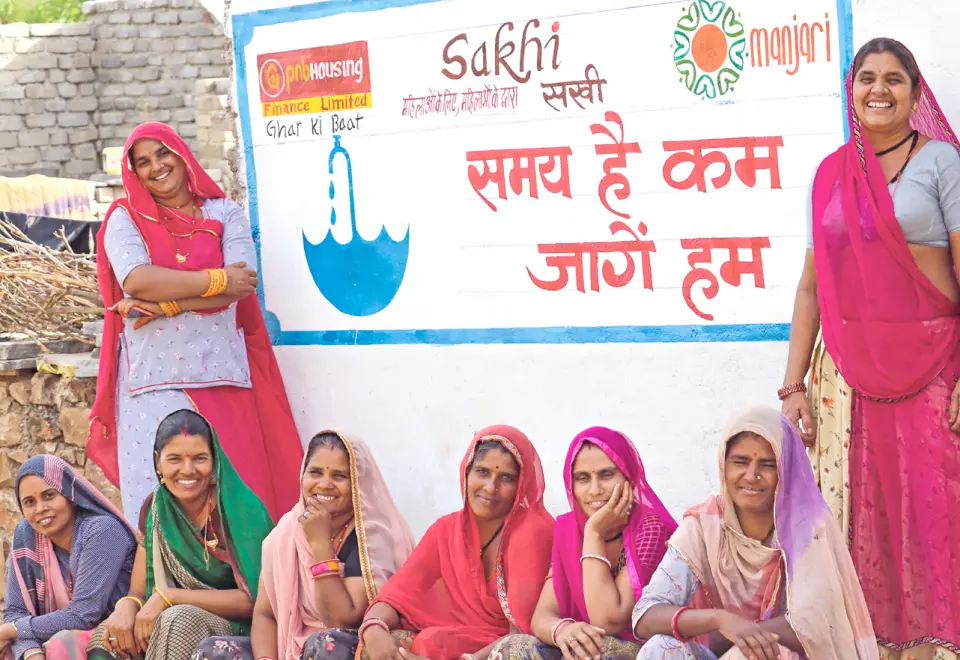Corporate social responsibility
About
Pehel Foundation
PNB Housing Finance aims to reach the marginalised communities and deliver projects that provides solutions for their betterment and growth yielding maximum impact to the beneficiaries. Pehel Foundation, CSR arm of PNB Housing Finance acts as the medium to implement and strengthen CSR programs designed in the same direction. It symbolizes our continuous ‘attempt’ and ‘initiative’ towards ensuring growth and welfare of underserved sections of society. Our overarching aim is maximising reach to improve more and more lives.
In FY 2019-20, the PNB Housing Finance Limited has established ‘Pehel Foundation’. It is the medium to implement and strengthen CSR programs. It symbolizes our continuous ‘attempt’ and ‘initiative’ towards ensuring growth and welfare of underserved sections of society. Our overarching aim is maximising reach to improve more and more lives.
PNB Housing
CSR Interventions
In Women Empowerment, we visualise to achieve overall growth and development of women belonging to the marginalised community. We aim to achieve enhanced income levels of women, instilling financial independence and self-confidence and addressing health issues related to women health and hygiene.
The women empowerment projects supported/initiated are as follows:
- a. Two Napkin Manufacturing Units were set up in the last financial year. One is in Lucknow and the other is in Valsad, Gujarat. 64 women from the nearby villages are currently involved in production, packaging and selling of napkins. The women are also involved in conducting awareness sessions in their villages for other rural women who live with several health hazards due to lack of awareness on menstrual hygiene. The target is to reach out to rural women in 200 villages.
- b. Three units of spice and pickle production were set up engaging 115 rural women in production, packaging and selling. All the women who are running the set up have been organised into self help The profits earned by them is utilised to grow the business and also distributed amongst the members.
- c. With a goal to ensure ‘Improved Quality of Life’, a project was designed keeping in mind to benefit the migrant population who were badly hit due to Covid. In this project 150 women were trained belonging to the construction working population and were further placed in the fashion industry. In this advanced training special sewing machines were imported from Japan on which women learnt and practiced prior to getting placed. On an average the placed women are earning Rs 10,000 per month.
- d. Skill development project for 420 deaf women on 4 different trades has been planned. The trades are mixer grinder repair, LED repair, mobile repair and electrical. Post the trainings these women will be skilled in the special trades which will further enable them to be financially independent.
- e. A creche has been constructed for taking care of the kids (up to age of 10) of the women workforce at LV Prasad Eye Hospital in Bhubaneshwar, Odisha. Due to this initiative, the women feel empowered to continue working without having to struggle in choosing between work and family. Post this initiative, some of the women employees are approaching to come back to work who had left earlier.
- f. A Skill development project has been executed for 120 rural women in 7 rural centres at villages of Rajasthan. They underwent a training of 6 months after completion of which they work on the looms provided to them through this project. They further sell the carpets and are currently making good profits in the carpet making sector.
Health, being another core theme, we strive to design projects that promise better healthcare services, advanced health infrastructure and better reachability of health services to the deprived community.
CSR Projects supported /initiated are as follows:
- a. 6 PHC (primary health center)/CHC (community health center) were supported where the infrastructure has been completely transformed into better standards. In some of these centers several medical and lab equipment has been installed like advanced laboratories and testing machines, etc.
- b. 2 Government hospitals were supported with several medical and lab equipment along with infrastructure upgradation. One of them (Sassoon General Hospital, Pune) which has a footfall of 4000 OPD patients and 1500 indoor patients, has been supported in a very big scale with infrastructure upgradation and advanced laboratory set up which ensures daily 500 lab tests done.
- c. 4 mobile medical clinics planned in 4 locations (Delhi, Mumbai, Kolkata and Chennai) to cater to the workers population. These mobile clinics will reach out to the vicinities at slum dwellings and construction sites to impart healthcare services free of cost at the sites itself to the construction workers who are unable to access the regular health centers.
- d. 2 patient transport buses have been planned to support conveyance of patients to nearest health centres. These patients who dwell in rural interior villages and do not have convenient access to the health centres can now visit healthcare centers via this transportation.
- e. 250 hearing aids were distributed to hearing impaired children. These hearing aids are like a blessing to these kids. After using the hearing aids they could be trained in speech and they have initiated speaking as well.
In Education we selectively choose projects that promise to offer students a better learning journey and future through interventions which include advanced learning technology, better infrastructure, scholarships and learning aid.
The projects supported /initiated are as follows:
- a. 4 Govt. Anganwadis have been upgraded with better infrastructure, educational materials, play area and toys. Similar work is in progress in another five Anganwadi. All the upgradation activities has encouraged more kids to come to the Anganwadis on a daily basis.
- b. School transformation has been done in 2 schools with infrastructure development, learning aids and informative wall art for the students. Innovative play area ,hygienic toilets named as ‘Swachhata Vahini’ constructed in the shape of a bus and exclusive dining area are the distinguishing features that makes these Govt. schools stand out in the region and attract more admissions from the nearby villages.
- c. Solar panels are installed in 23 Govt. schools in those rural villages where electricity connection has reached but load shedding is a big challenge. Specially in summers when there is no current during the daytime, this intervention reduces the absenteeism caused due to inconvenience to students due to load shedding.
- d. E-learning Infrastructure has been installed in 47 govt. schools where students have access to audio-visual aids for learning. 4500 students will have access to online interactive classes everyday through the e-learning infrastructure installed to take their learning curves up.
- e. A Scholarships project has been initiated to reach out to the underprivileged students from all sections of the society to support and motivate them for completion of their studies. This scholarship is to be imparted to 400 students across Pan India.
- f. 1 School bus has been supported for transportation of students from several tribal villages to the nearest school in rural locations of Jharkhand. The tribal school children have no access to transportation to school, due to poor family income and mostly come from remotely located areas. The provision of School bus will help them overcome the hesitancy to attend school and give them the access to equal educational opportunity.
- g. STEM (Science Technology Engineering Maths) learning to be supported in 20 schools. This project will deliver quality STEM education by conducting various practical activities, workshops, hands-on practice and experiential fun learning that help students to learn various concepts and skills. It will Enhance innovative skills such as computational thinking, problem-solving skills, creative thinking, logical reasoning, better decision making, and good observation power.
In order to rejuvenate the environment and give back to our society, we took the responsibility of working on recharge, recycling and natural resource management which would reduce pollution due to waste and provide clean water to the beneficiaries.
The projects supported /initiated are as follows:
- a. Two ponds were developed from scratch benefitting a population of 1606 villagers with a capacity to harvest27.22 million litres of water annually. This will benefit them in agriculture ,horticulture and water availability for animals which will further result in income enhancement of the villagers.
- b. Safe drinking water supply system to household level has been established in two villages Gowla and Mal ki toos in Rajasthan. In these 2 villages 944 villagers are getting direct water pipeline connection for the first time in their life. In this project overhead tank has been constructed along with solar water lifting system and water committee has been formed to ensure sustainable functioning of the system.
- c. Three RO plants of a capacity of dispensing 1000 litres of water in one hour have been established at areas where sufficient water availability and water quality is a huge issue. Collectively from the 3 plants, it is expected to cover 75000 population annually.
- d. In plastic waste management, installation of 16 plastic bottle crushers are ongoing at public places where plastic waste is generated in huge volume. Through this project we aim to motivate the public to dispose the plastic pet bottles in these machines, which will be crushed in the machines and sent for recycling to recycling units. This project will reduce tons of plastic waste to get into the landfills and will be sent directly for recycling.
PNB Housing
Corporate Social Responsibility
Vision Statement
At PNB Housing Finance Corporate Social Responsibility is a way of life. We have embodied the principles of corporate responsibility in our business philosophy and operations. In our journey so far, we have built a sustainable business model and created value for our stake holders. We are confident that we will be able to improve the lives of under privileged and reinforce our humble collective efforts towards nation building.
Mission Statement
To plan interventions which are holistic in nature and attempts to improve the socio- economic condition of the community at large. The interventions will not only impact the development of the direct beneficiaries but has also attempt to enhance the quality of lives of those who are present in the ecosystem of the impact area.













